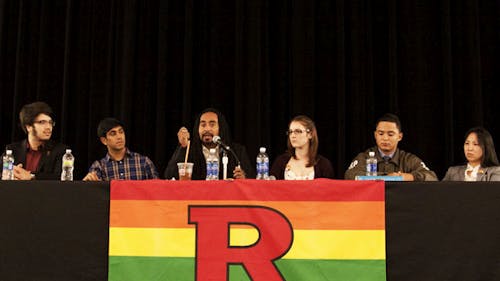Panelists share experiences of being an ally

A panel of speakers from throughout the University community shared their stories of how they became allies during last night’s “Coming ‘Out’ as an Ally: Standing with the LGBTQ Community” at Livingston Hall in the Livingston Student Center.
The event, co-sponsored by the Center for Social Justice Education and LGBT Communities and the Queer Student Alliance, gave students the opportunity to learn how to become an ally to the lesbian, gay, bisexual, transgender and questioning (LGBTQ) community.
“Tonight we’re flipping the switch on LGBTQ folks,” said Jenny Kurtz, director of the Center of Social Justice. “Tonight we are inverting the panel and inviting allies of the LGBTQ community to the challenge.”
Panelists included Ji Lee, director of Asian American Cultural Center; Aamir Lalani, a peer mentor of the Livingston Social Justice Learning Community; Matt Cordeiro, Rutgers University Student Assembly president; Taylor Westerlind, a resident of Rainbow Perspectives; David Agosto, member of Lamda Theta Phi, and keynote speaker Michael Sean Funk.
Funk, a doctoral candidate at the University of Massachusetts, Amherst School of Education, said he is active in the LGBTQ community as an ally and supports the rights of LGBTQ members.
“As ally extraordinaire, we are all very committed to being allies,” he said. “Usually I say I’m blessed to be somewhere. ... I replace blessed with privileged as a heterosexual on coming out to speak with our allies.”
Funk, who supervised the first same-sex home adoption study in Pennsylvania, said although it seems glamorous to call himself an ally, it was a shameful process to get there.
Although he did not bully, he said he adopted the silent acceptance of the LGBTQ community.
“I converted to Pentecostalism, and friends of mine in the church ended up acquiring AIDs and died due to complications,” he said. “We concluded to ‘don’t ask, don’t tell’ in the church.”
But he had a breakthrough experience when he went to Massachusetts and said he could not imagine a world without gays or lesbians.
“We call our neighborhood, the ‘gayborhood,’” Funk said.
Funk believes social justice education is key in improving LGBTQ acceptance, and that hundreds of people had flawed thinking.
“It’s happening with youth,” he said. “It only gets better if allies get better.”
Westerlind, a School of Arts and Sciences sophomore, was a part of the pilot program last year with Rainbow Perspectives and learned through her experience.
“I never really thought about as coming out as an ally until a few days ago,” she said. “When you hint at some sort of discrimination I’m one of the first to say something. I wear a pride pin, and I wear it like a big flag over my head. “
Lalani, a School of Arts and Sciences sophomore, said last year was his first socialization with LGBTQ youth while living at the Livingston Social Justice Learning Community.
“Homosexual is pretty much a taboo in the Indian culture. LGBTQ is sometimes used as objects of criticism and entertainment in the media,” he said. “In my experience with LGBTQ community, I came out as an ally not just because of my friends but ... I am [also] against the ridicule.”
Agosto, a School of Arts and Sciences sophomore, said he grew up with a stigma of a laissez-faire attitude and passive approach to the LGBTQ community.
“I grew up in Perth Amboy, the big think in my town was almost as though gay was a race,” he said. “You were gay before you were black, gay before you were white.”
But Agosto said he was not an ally until he pledged to his fraternity.
“My pledge brother is homosexual. Now I drive him to see his boyfriend when he needs a ride,” he said. “I would never have thought of doing that [when] I was in high school.”
Cordeiro, a School of Arts and Sciences senior, said he also grew up in an environment that was not open regarding the LGBTQ community.
“I come from a safe, pretty small suburban town. … I was surrounded by so much diversity, but I knew little of it,” he said. “I was totally oblivious to this when I was in high school when kids didn’t come out because they didn’t feel safe.”
While at the University, Cordeiro was a part of the inaugural class in the Department of Social Justice addressing the LGBTQ community where he experienced first-hand discrimination against a war veteran who was unable to have his same-sex marriage acknowledged in the United States.
“I support these people, and I think it’s atrocious that we don’t support these people,” he said. “The fight is in our hands — I want to be there to fight wherever I am needed.”
Lee said she did not understand what it meant to be an ally until her post-college work as a health educator focused on HIV prevention.
“While working with the Health Education Office, I attended a conference for LGBTQ Asians at [New York University]. There were thousands of people there but only five allies,” she said. “I was completely outside my comfort zone. I acknowledged my heterosexual privileges and opened up my heart.”
Funk said many are dehumanized by differences in sexuality because it has become a major focus of society, but he said people should keep race and upbringing in mind when acknowledging social injustice.
“Often times we are taught about either [sexual discrimination or racial discrimination] but not both,” he said. “When we talk about oppression, we discuss all.”



